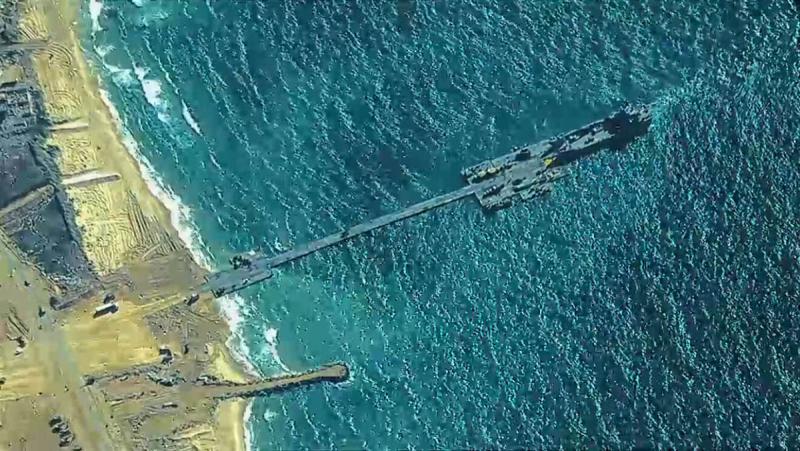GAZA
Trucks carrying badly-needed aid for the Gaza Strip have rolled across a newly-built US floating pier into the besieged enclave for the first time.
The Friday shipment is the first in an operation that US military officials anticipate could scale up to 150 truckloads a day entering the Gaza Strip as Israel presses in on the southern city of Rafah as its seven-month offensive against Hamas rages on.
US officials and aid groups warned the pier project is not considered a substitute for land deliveries that could bring in all the food, water and fuel needed in Gaza.
Before the war, more than 500 truckloads entered Gaza on an average day.
The operation’s success also remains tenuous due to the risk of militant attack, logistical hurdles and a growing shortage of fuel for the trucks to run due to the Israeli blockade of the Gaza Strip since the October 7 Hamas attack on Israel that killed 1,200 people and took 250 others hostage.
Israel’s offensive since then has killed more than 35,000 Palestinians in the Gaza Strip, local health officials say, while hundreds more have been killed in the West Bank.
The US military acknowledged the aid movement in a statement on Friday.
Troops finished installing the floating pier on Thursday.
Hours later, the Pentagon said humanitarian aid would soon begin flowing and that no hold-ups were expected in the distribution process, which is being co-ordinated by the United Nations (UN).
The UN, however, said fuel deliveries brought through land routes have all but stopped and this will make it extremely difficult to get the aid to Gaza’s people.
“We desperately need fuel,” UN deputy spokesman Farhan Haq said. “It doesn’t matter how the aid comes, whether it’s by sea or whether by land, without fuel, aid won’t get to the people.”
Pentagon spokeswoman Sabrina Singh said the issue of fuel deliveries comes up in all US conversations with the Israelis.
She also said the plan is to begin slowly with the sea route and ramp up the truck deliveries over time as they work the kinks out of the system.
Aid agencies say they are running out of food in southern Gaza and fuel is dwindling while the US Agency for International Development and the World Food Programme say famine has taken hold in Gaza’s north.
Israel claims it places no limits on the entry of humanitarian aid and blames the UN for delays in distributing goods entering Gaza. Its control of the Gaza side of the Rafah crossing has alienated Egypt and prevented cooperation on aid delivery.
Some analysts believe the new pier mode of delivery will partially marginalise the Rafah crossing and Egypt’s role.
The UN says fighting, Israeli fire and chaotic security conditions have hindered delivery. Israel also fears Hamas will use the fuel in its fight against Israeli troops.
Under pressure from the US, Israel has in recent weeks opened a pair of crossings to deliver aid into hard-hit northern Gaza and said a series of Hamas attacks on the main crossing, Kerem Shalom, have disrupted the flow of goods. There have also been violent protests by Israelis disrupting aid shipments.
Israel recently seized the key Rafah border crossing in its push against Hamas around that city on the Egyptian border, raising fears about civilians’ safety while also cutting off the main entry for aid into the Gaza Strip.
US President Joe Biden ordered the pier project, expected to cost $320 million.
The boatloads of aid will be deposited at a port facility built by the Israelis just south-west of Gaza City and then distributed by aid groups.
US officials said the initial shipment totalled 500 tonnes of aid. The US has closely co-ordinated with Israel on how to protect the ships and personnel working on the beach.
Later on Friday, the Israeli military said dozens of Israeli protesters attacked a truck in the occupied West Bank, beating its driver and setting it on fire in an apparent attempt to prevent aid from reaching Gaza.
The Israeli military says soldiers arrived at the scene late in the day and tried to separate the attackers from the driver and provide medical treatment.
It says the protesters then attacked the soldiers, lightly wounding two officers and a soldier. According to Israeli media, the truck was carrying ordinary commercial goods, not aid for Gaza.


